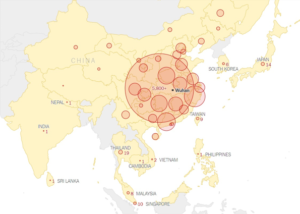Heart to Heart International is preparing possible response to the Coronavirus outbreak
January 31, 2020
A new Coronavirus (2019-nCoV) from Wuhan, China was identified in December 2019 and has caused 9,925 confirmed cases of respiratory disease, resulting in 222 deaths as of January 31, 2020. However, these numbers continue to increase, and experts warn that actual infection rates and number of deaths may be higher than the official figures, given the rapid rate of spread and burdened health infrastructure.
In an emergency meeting convened Thursday, January 30, the World Health Organization (WHO) declared the 2019-nCoV outbreak a public health emergency of international concern. With this declaration, the WHO considers the 2019-nCoV virus an outbreak that will affect countries other than China and will require international coordination to control and/or eliminate.

Suspected and confirmed cases have been reported in at least 21 countries, with 98% of cases near Wuhan City, Hubei Province in China. The cases that have been identified outside of China are largely linked to travel to China, however eight person-to-person transmissions have been confirmed in Germany, Japan, Vietnam, and the U.S.
Coronaviruses are a large family of viruses that cause illness ranging from the common cold to more severe diseases such as MERS (Middle East Respiratory Syndrome) and SARS (Severe Acute Respiratory Syndrome). As with other respiratory viruses, the new 2019-nCoV can be spread through the air by coughing or sneezing, or by coming into contact with an infected person or an object or surface with the virus on it. Common signs of infection include respiratory symptoms, fever, cough, shortness of breath and breathing difficulties. In more severe cases, infection can cause pneumonia, severe acute respiratory syndrome, kidney failure and even death. Standard recommendations to prevent infection spread include regular hand washing, covering mouth and nose when coughing and sneezing, thoroughly cooking meat and eggs. Avoid close contact with anyone showing symptoms of respiratory illness such as coughing and sneezing
HHI is tracking the situation closely and has reached out to authorities in affected areas across Asia and the U.S. with offers of assistance. The HHI Disaster Response Team has alerted its volunteer roster of more than 200 medical professionals and is taking action to acquire additional personnel protective equipment (PPE) that includes infection control items required for screening and treatment during outbreak situations.
The WHO has notified its system of Emergency Medical Teams (including HHI) to ascertain their state of readiness and availability should there be an international request for medical teams. These rapid response teams would be used to strengthen screening, disease tracking, treatment and isolation capacities in selected locations, such as healthcare facilities, airports or critical infrastructure.
HHI is mobilizing resources to be ready to respond to the medical needs of affected populations when requested by WHO, or to operate independently if the need arises.
